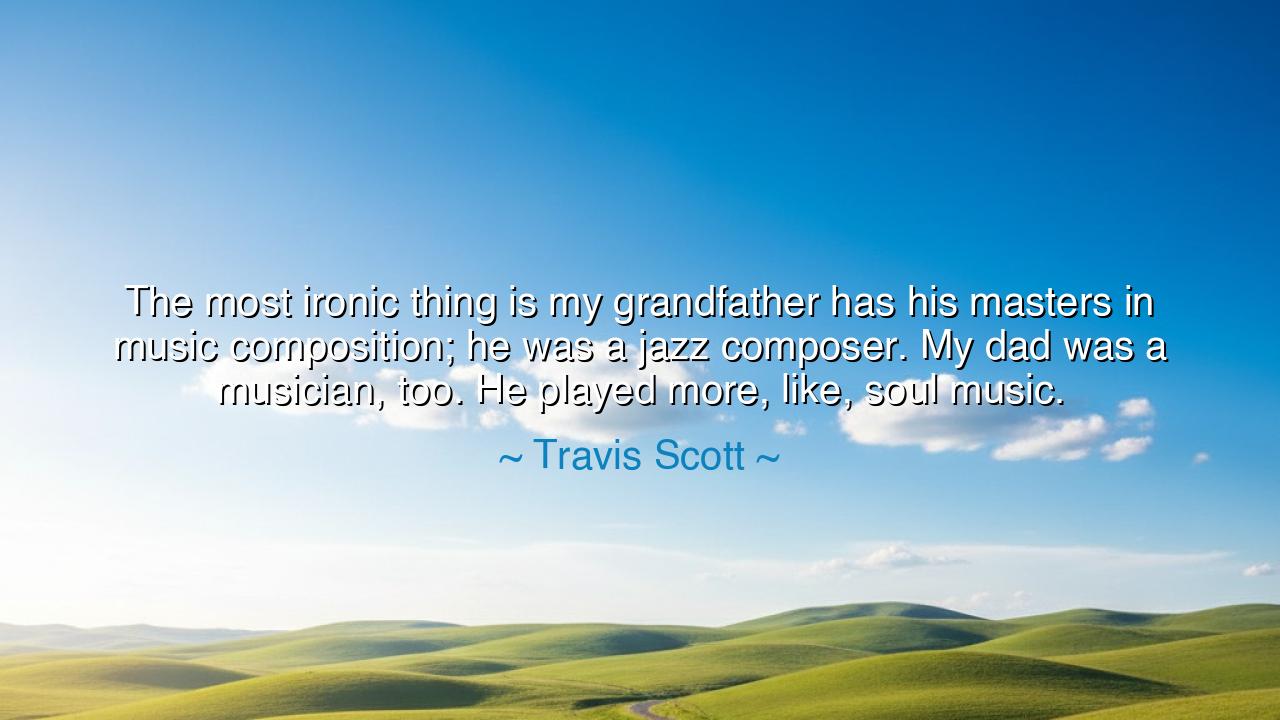
The most ironic thing is my grandfather has his masters in music
The most ironic thing is my grandfather has his masters in music composition; he was a jazz composer. My dad was a musician, too. He played more, like, soul music.






The words “The most ironic thing is my grandfather has his master’s in music composition; he was a jazz composer. My dad was a musician, too. He played more, like, soul music,” spoken by Travis Scott, form more than a casual reflection on family history — they are a meditation on heritage, evolution, and the mysterious continuity of art through generations. Beneath their modern rhythm lies an ancient pattern, one known to every lineage of creators: that genius runs like blood, not as imitation but as transformation. In this lineage of melody — from jazz to soul to the electric pulse of modern hip-hop — we see not a break in tradition, but its renewal. For the child of the artist must not merely repeat his ancestors’ song; he must find the hidden harmony that joins their music to his own time.
When Scott calls it “ironic,” he gestures toward the unexpected — that he, the modern architect of sound, emerged from a line rooted in more traditional music. Yet what he calls irony, the ancients would call destiny. The soul carries within it the echoes of its forebears, even when it seems to wander far from them. His grandfather, the jazz composer, moved through the realm of improvisation and structure — music that was both freedom and form, born from the struggle and triumph of a people inventing beauty from pain. His father, devoted to soul music, carried that same torch of emotion — the voice of love, longing, and resilience. And Travis, in his turn, took these legacies and transmuted them into the language of his own age: digital beats, atmospheric textures, and the modern poetry of rhythm and self-expression. What seems like divergence is in truth continuity in disguise.
The ancient philosophers would have recognized this pattern as the law of inheritance through transformation. In every age, the son inherits the tools of his father — not to replicate them, but to refine them. The sculptor of Greece shaped marble; the painter of Florence shaped color; the producer of today shapes sound itself. Each, in his own way, serves the same divine impulse: to create order from chaos, and beauty from experience. The irony that Travis speaks of, then, is not a contradiction but a revelation: that art never dies, it only changes form. What was once jazz improvisation becomes digital experimentation; what was once soul’s lament becomes hip-hop’s anthem. The same flame burns, only in new lamps.
This cycle has appeared throughout history. Consider Ludwig van Beethoven, who learned under Haydn and inherited the discipline of classical form, yet turned it into something vast and emotional — the birth of romantic music. His teacher may not have recognized the storm he unleashed, but it was born from the very tradition he had been given. Or think of Picasso, who began as a student of realism and emerged as the father of cubism. Each generation of creators must walk this paradox: to honor the past, yet break from it. That is the unspoken oath of the artist’s lineage — to take the raw material of one’s heritage and mold it into something that speaks for the present age.
In this way, Travis Scott’s quote carries the wisdom of centuries. His grandfather’s jazz taught freedom within form. His father’s soul taught emotion within sound. His own music fuses both — structure and feeling, rhythm and rebellion — into a modern myth for a generation that lives between worlds, analog and digital, past and future. Though he speaks in the language of music, the truth applies to all who create or seek meaning: what we inherit is not a prison, but a foundation. The weight of legacy is not a burden but a springboard — if one has the courage to leap.
Yet there is another lesson here, quieter and more tender. The quote reminds us of the invisible threads of family, the way talents, values, and passions weave through bloodlines even when the individuals themselves do not fully see it. In the story of three generations — grandfather, father, son — we witness not only artistic evolution but the sacred transmission of spirit through time. Though their instruments and styles differ, their essence is the same: the longing to create, to communicate, to translate emotion into something eternal. Every family carries such invisible inheritances — not all musical, but all meaningful. To know one’s roots is to understand one’s purpose; to deny them is to lose part of one’s strength.
So, let this be the teaching drawn from Travis Scott’s words: honor your lineage, but do not be confined by it. What you receive from those before you is not a script but a seed. Tend it, water it, and let it bloom into a form that belongs to your time and your soul. The world does not need another echo — it needs your voice. And as you shape your destiny, remember that what you call “irony” may, in truth, be fate smiling through disguise. For just as his grandfather composed jazz and his father played soul, Travis now composes the sound of his generation — proof that the music of life never ends, it only finds new instruments to sing through.






AAdministratorAdministrator
Welcome, honored guests. Please leave a comment, we will respond soon